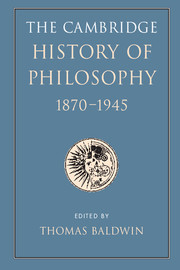Book contents
- Frontmatter
- Contents
- List of contributors
- Introduction
- I 1870–1914
- 1 Positivism, Idealism, and Pragmatism
- 2 Psychology and Philosophy
- 7 Psychology: old and new
- 8 The unconscious mind
- 3 Logic, mathematics, and judgement
- 4 Philosophy and the new physics
- 5 The idea of social science
- 6 Ethics, politics, and legal theory
- 7 Philosophy of religion and art
- Interlude
- II 1914–1945
- Biobibliographical appendix
- Bibliography
- INDEX
- References
7 - Psychology: old and new
from 2 - Psychology and Philosophy
Published online by Cambridge University Press: 28 March 2008
- Frontmatter
- Contents
- List of contributors
- Introduction
- I 1870–1914
- 1 Positivism, Idealism, and Pragmatism
- 2 Psychology and Philosophy
- 7 Psychology: old and new
- 8 The unconscious mind
- 3 Logic, mathematics, and judgement
- 4 Philosophy and the new physics
- 5 The idea of social science
- 6 Ethics, politics, and legal theory
- 7 Philosophy of religion and art
- Interlude
- II 1914–1945
- Biobibliographical appendix
- Bibliography
- INDEX
- References
Summary
INTRODUCTION
Psychology as the study of mind was an established subject throughout the nineteenth century in Britain, Germany, France, and the United States. This established psychology was in part a school discipline, conveyed in textbooks and lectures surveying the theory of mind. Standard topics included the senses, imagination, memory, intellect, emotions, will, bodily motion, the nature of mind, and the question of mind-body interaction.
During this time, psychology was also an object of research and speculation by physicians and independent scholars. James Mill, John Stuart Mill, George Henry Lewes, Francis Galton, and George Romanes, none of whom held university appointments, published general works or specialist treatises on psychological topics. From early in the century physicians conducted empirical research on sensory perception, drawing on their own perceptual experience and clinical observation. Textbooks on human and comparative physiology contained psychological chapters, and medical journals published psychological work (e.g., Carpenter 1837, Dunn 1858). Early on J. F. Herbart (1816 [1891], 1824–5) and F. E. Beneke (1833) in Germany, and later Alexander Bain (1855: v) and Lewes (1857: 621) in Britain, renewed the call for a genuinely scientific psychology or ‘science of mind’ (a call issued earlier by Bonnet 1755 and Krüger 1756, among others).
By the middle of the century quantitative studies, found sparsely but regularly in eighteenth-century works on vision, were becoming common in sensory physiology and psychology. At universities, the discipline of psychology was variously located within faculties or schools of philosophy. ‘Philosophy’ at this time had both broad and narrow senses. Broadly, it was roughly equivalent to the ‘arts and sciences’; narrowly, it might be restricted to logic, metaphysics, moral philosophy, and natural philosophy (though the latter was becoming separate as ‘natural science’).
- Type
- Chapter
- Information
- The Cambridge History of Philosophy 1870–1945 , pp. 91 - 106Publisher: Cambridge University PressPrint publication year: 2003
References
- 6
- Cited by



